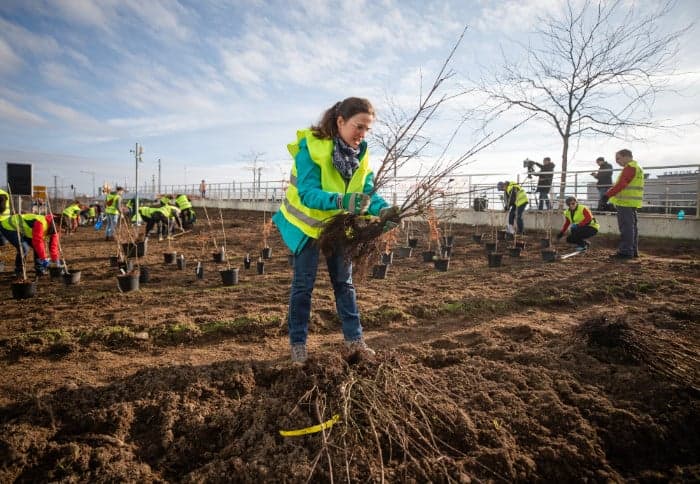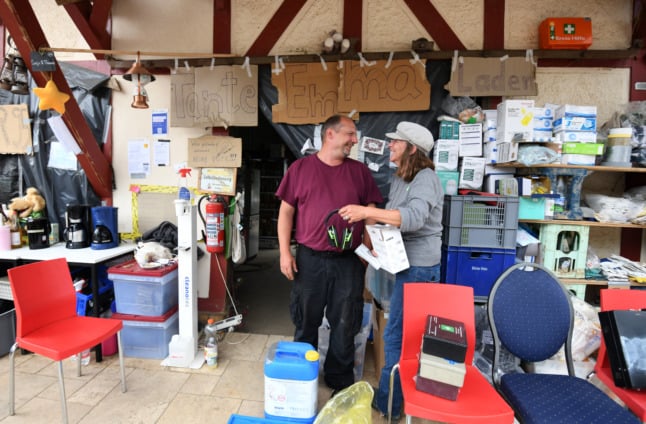How to volunteer in Germany - even if you speak no or little German

As spring begins to blossom across Germany, some international residents are looking for ways to give back to their communities. Volunteering opportunities abound across the country, but it can be tough to pinpoint how to get involved.
The Local spoke with different volunteer organisations to distil how you can find volunteer opportunities to give back to your community in Germany.
Where should you look
The “Rathaus”, or city hall, is a great place to start to find volunteer opportunities in your city. You can also look for “Freiwilligenmesse”, or volunteer exhibition fairs, where you can hear from several volunteer organisations at once. These events are commonly held annually across the country in cities like Berlin, Munich and Stuttgart. Some volunteer organisations also table at trade events.
Churches and other religious organisations can also point you in the right direction for potential volunteering opportunities. You can speak directly with your local church or search for charities related to different religious denominations.
For those interested in finding opportunities online, Vostel, a web platform aggregating volunteer opportunities across Germany, and German Volunteers provide users ways to meet the needs of community organisations in the short and long term.
You can also look for “Vereine”, or registered voluntary associations or clubs, to find another option for learning which organisations are looking for additional help. Joining a local volunteer Verein can provide another path to connecting with other like-minded people in your city.
READ ALSO: Explained: How to start your own Verein in Germany
Still volunteering is not limited to in person activities. Online opportunities can include tutoring and transcribing documents so that they can be added to digital archives.
Language requirements
When volunteering, knowing German can be a major plus, but it is far from a requirement. Of the more than 2,100 open volunteering opportunities offered on Vostel, 93 percent or just under 2,000 projects required no basic, medium or advanced German skills to complete.
Time Commitment
Volunteer opportunities in Germany run the gamut of one-off shifts to year-long commitments. The rate of volunteering in Germany has grown across all age groups since 1999, according to the German Survey on Volunteering published in 2021.

Volunteers stand in front of Tante Emma, a store offering free daily essentials to displaced residents after 2021 flooding in the wine village Dernau, Rhineland-Palatinate, western Germany. Photo: "Without volunteers nothing here would work," said one helper. Photo: INA FASSBENDER / AFP
Long term opportunities
For those interested in volunteering full time, Germany offers several opportunities to get involved. These opportunities are available to German citizens and internationals from EU and non-EU states.
The Voluntary Social Year (FSJ) lasts between 6 and 18 months. The experience allows anyone from 16 to 27 to volunteer across the country and world. The placements can revolve around sports, culture, social affairs and more. Volunteers are expected to have at least an A1 or A2 understanding of German to participate. Over the volunteer period, you will receive a monthly stipend, holiday leave, and paid statutory social insurance.
Volunteers between the ages of 15 and 27 interested in climate change and the environment can also participate in the Voluntary Ecological Year (FÖJ). Volunteers can choose the location of their placement and will work for small- and medium- sized companies to learn more about the importance of sustainable business. The year blends relevant on-the-ground career training with seminars focused on environmental protection and intercultural topics.
For those older than 27 interested in spending a year volunteering, the Federal Voluntary Service (BFD) may be a better fit. Volunteers can work for up to 18 months, or up to 24 months if they need additional time to cope from the social and career impacts of the pandemic. Placements could include gymnastics for the elderly, wheelchair sports, and children’s painting.
It is important to note, that regardless of if the work is paid or fully voluntary, you will need legal documents like a residence permit or visa. The visa must be issued for voluntary service, meaning visas previously given for study or au pair would not be permitted.
Comments
See Also
The Local spoke with different volunteer organisations to distil how you can find volunteer opportunities to give back to your community in Germany.
Where should you look
The “Rathaus”, or city hall, is a great place to start to find volunteer opportunities in your city. You can also look for “Freiwilligenmesse”, or volunteer exhibition fairs, where you can hear from several volunteer organisations at once. These events are commonly held annually across the country in cities like Berlin, Munich and Stuttgart. Some volunteer organisations also table at trade events.
Churches and other religious organisations can also point you in the right direction for potential volunteering opportunities. You can speak directly with your local church or search for charities related to different religious denominations.
For those interested in finding opportunities online, Vostel, a web platform aggregating volunteer opportunities across Germany, and German Volunteers provide users ways to meet the needs of community organisations in the short and long term.
You can also look for “Vereine”, or registered voluntary associations or clubs, to find another option for learning which organisations are looking for additional help. Joining a local volunteer Verein can provide another path to connecting with other like-minded people in your city.
READ ALSO: Explained: How to start your own Verein in Germany
Still volunteering is not limited to in person activities. Online opportunities can include tutoring and transcribing documents so that they can be added to digital archives.
Language requirements
When volunteering, knowing German can be a major plus, but it is far from a requirement. Of the more than 2,100 open volunteering opportunities offered on Vostel, 93 percent or just under 2,000 projects required no basic, medium or advanced German skills to complete.
Time Commitment
Volunteer opportunities in Germany run the gamut of one-off shifts to year-long commitments. The rate of volunteering in Germany has grown across all age groups since 1999, according to the German Survey on Volunteering published in 2021.

Long term opportunities
For those interested in volunteering full time, Germany offers several opportunities to get involved. These opportunities are available to German citizens and internationals from EU and non-EU states.
The Voluntary Social Year (FSJ) lasts between 6 and 18 months. The experience allows anyone from 16 to 27 to volunteer across the country and world. The placements can revolve around sports, culture, social affairs and more. Volunteers are expected to have at least an A1 or A2 understanding of German to participate. Over the volunteer period, you will receive a monthly stipend, holiday leave, and paid statutory social insurance.
Volunteers between the ages of 15 and 27 interested in climate change and the environment can also participate in the Voluntary Ecological Year (FÖJ). Volunteers can choose the location of their placement and will work for small- and medium- sized companies to learn more about the importance of sustainable business. The year blends relevant on-the-ground career training with seminars focused on environmental protection and intercultural topics.
For those older than 27 interested in spending a year volunteering, the Federal Voluntary Service (BFD) may be a better fit. Volunteers can work for up to 18 months, or up to 24 months if they need additional time to cope from the social and career impacts of the pandemic. Placements could include gymnastics for the elderly, wheelchair sports, and children’s painting.
It is important to note, that regardless of if the work is paid or fully voluntary, you will need legal documents like a residence permit or visa. The visa must be issued for voluntary service, meaning visas previously given for study or au pair would not be permitted.
Join the conversation in our comments section below. Share your own views and experience and if you have a question or suggestion for our journalists then email us at [email protected].
Please keep comments civil, constructive and on topic – and make sure to read our terms of use before getting involved.
Please log in here to leave a comment.